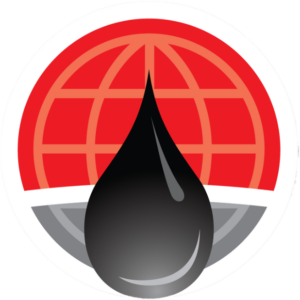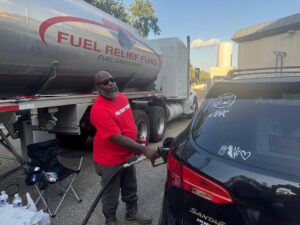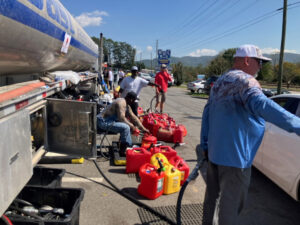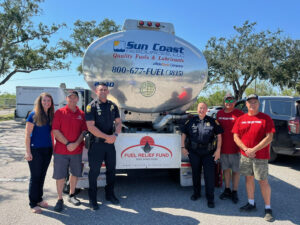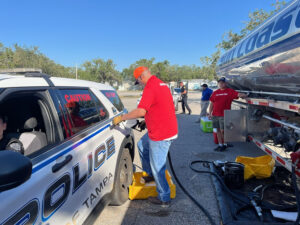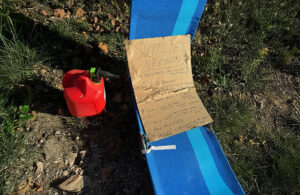April 15, 2025 | fuelrelieffund
When a hurricane is on the horizon, most people rush to the store for bottled water, canned food, and batteries. But there’s one essential that often gets overlooked until it’s too late: fuel.
Whether you need it to evacuate, run a generator, or power communications, fuel becomes a lifeline during and after a disaster. At Fuel Relief Fund, we’ve seen firsthand how critical it is — and how quickly it runs out when panic buying and supply chain breakdowns hit.
As we head into hurricane season, it’s important to prepare smartly, stay safe, and help your community weather the storm.
-
Fuel Up Early – Don’t wait until Landfall is Imminent
One of the most effective things you can do is fuel up early. In the days leading up to a storm, gas stations often see long lines and limited supplies. Waiting too long can leave you stuck without enough fuel to evacuate or power essential equipment.
TIP: We recommend keeping your tank at least half full throughout hurricane season, and filling up fully if a storm is projected to make landfall in your area.
-
Safely Store Extra Fuel – and Know the Limits
If you rely on generators or other fuel-powered equipment, storing a small supply of gasoline or diesel can be life-saving. But safety is key.
Tips for Safe Storage:
- Only use approved fuel containers
- Store fuel in a well-ventilated area, away from heat sources or open flames
- Don’t store fuel inside your home or near living areas
- now your local fire codes and regulations
A little preparedness can make a big difference, but safety should always come first.
-
Maintain Your Generator and Know How to Use It
Generators can keep fridges running, phones charged, and medical devices powered — but they need to be maintained regularly and operated correctly.
Pre-Storm Checklist:
- Run and test your generator well before the storm
- Check oil levels and replace old fuel
- Store enough fuel for at least 72 hours of intermittent use
- NEVER run a generator indoors or in an enclosed space
Improper generator use can lead to carbon monoxide poisoning, so it’s critical to follow safety guidelines.
-
Don’t Forget Fuel for Relief and Recovery
Fuel isn’t just about your personal preparedness. After a storm, it powers the trucks delivering supplies, the ambulances getting patients to care, and the chainsaws clearing roads.
That’s why Fuel Relief Fund exists — to fill the fuel gap when disaster strikes. In the aftermath of hurricanes, we deploy rapidly to provide free fuel to first responders, relief teams, and communities that have lost access.
When fuel infrastructure fails, Fuel Relief Fund helps everything keep going.
-
Help us Fuel the Response
As you prepare for hurricane season, consider how you can help others do the same. Share this blog with your network. Talk to neighbors about storing fuel safely. And if you’re in a position to give, support our disaster response work.
With your help, we can be ready before the storm hits — and we can keep hope moving after it passes.

